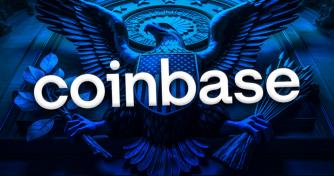 Walmart patents own cryptocurrency as battle with Amazon for retail intensifies
Walmart patents own cryptocurrency as battle with Amazon for retail intensifies Walmart patents own cryptocurrency as battle with Amazon for retail intensifies

Cover art/illustration via CryptoSlate. Image includes combined content which may include AI-generated content.
Walmart, the world’s largest company by revenue and employees, filed a patent on its own cryptocurrency. The move appears to be an attempt to gain an edge against Amazon in an effort to retain control over retail, and comes shortly after Facebook’s entrance into the sector with Libra.
Walmart breaking into cryptocurrency
On July 31 Walmart applied for a patent for a “digital currency,” tied to fiat, facilitated by the blockchain. In other words, a stablecoin.
The stablecoin would offer customers savings on purchases and would provide a way for the retailer’s lower-income customer base to gain access to financial services. These accounts would be “fee-free” or “fee-minimal,” and could even earn interest, claims Walmart.
“Using a digital currency, low-income households that find banking expensive, may have an alternative way to handle wealth at an institution that can supply the majority of their day-to-day financial and product needs.”
The move could represent a monumental move for banking the unbanked given the size of the retailer. Walmart is both the world’s largest company revenue and by employees, earning over $500 billion annually and employing over 2.2 million people—more people than the entire country of Slovenia.
Walmart intends to use the cryptocurrency to collect customer purchase history to improve inventory forecasts and predict consumer behavior, increasing the firm’s profitability.
Locked in combat with Amazon
The two titans of retail, Amazon and Walmart, are battling for the future of retail. And, a coin could prove a decisive edge.
In August 2016, Walmart purchased Jet for $3.3 billion in an attempt to catch up with Amazon’s dominance in the online retail sector. Last year, Walmart purchased Flipkart for $16 billion, Amazon’s largest rival in e-commerce in India.
Walmart also had its subsidiary, Sam’s Club, team up with Instacart to provide same-day grocery delivery in select cities. Instacart is the most popular alternative to Amazon’s grocery delivery service.
In response, in June 2017 Amazon purchase Whole Foods Market for $13.7 billion, encroaching on brick-and-mortar retail. In January 2018 the online retailer opened “Amazon Go” to the public—cashierless convenience stores. It has since rolled out 12 more locations and intends to expand the program to over 300 locations across the United States within two years, according to an Amazon employee who spoke on condition of anonymity.
Similar to Amazon Go, Walmart appears to be contemplating an entrance. The patent filing mentions “micromarkets,” which would provide an “unattended retail environment where consumers can purchase products from open shelves… and use a self-checkout kiosk to pay for products.” Walmart Coin would serve to facilitate quick payment at these micromarkets.
Last year, Amazon won two blockchain-related patents and may have accrued more since then.
Thus far, investors appear to be placing their bets on Amazon, with a market capitalization of over $923 billion compared to Walmart’s $315 billion.
That said, incumbent Walmart does have one major advantage: it’s three times larger than Amazon by revenue, meaning it can squeeze suppliers on prices and purchase inventory more cheaply through sheer economies of scale.
The stakes are high. Regardless of which corporation wins, the battle for retail will be bloody and protracted.
Ambitious plans for Walmart Coin
The patent lists several ambitious use-cases for the cryptocurrency. Some of the proposed ideas include a freelancer platform, emergency loans, merchandise futures, and multi-tender integration.
“For example, be a repair technician for a few hours, an associate for a few hours, a designated shopper. This digital currency ecosystem can be paired with a work board where customers, crowdsource prospects, and others can post requests and offers for work,” stated the filing.
The supermarket giants suggests that customers could purchase “digital currency futures.” These futures would allow users to buy its cryptocurrency and lock-in the coin’s value in goods or services at today’s prices.
“This could be a better way for customers to guarantee purchasing power for a period than putting money in a bank, while at the same time offering a predictable source of revenue for retailers.”
The coin could also be used to offer short-term, emergency loans, where the customer is charged “no interest or a fair interest rate,” for staples such as food.
Walmart even envisions incorporating its cryptocurrency with other types of tender, like credit cards, business accounts, and even government assistance programs like WIC and TANF (government food and cash assistance for indigent families).
For example, with such a system, alcohol payments could get charged to a credit card, food purchases to WIC, and office supplies to a business account automatically.
In some embodiments, Walmart even says the “digital currency value could, in some embodiments, be tied to other digital currencies,” like Bitcoin. The cryptocurrency won’t just be available for purchase using fiat. The retailer also states, by name, that it will be purchasable using Bitcoin.
Privacy concerns
That said, the stablecoin also poses concerns around privacy. Walmart explicitly intends to collect customer purchase history to improve inventory forecasts and predict consumer behavior. This means collecting terabytes of customer data. As said by the patent:
“In some embodiments, the digital currency may act as a pre-approved biometric (e.g., fingerprint or eye pattern) credit. A person is the ‘credit card’ to their own digital value bank.”
And, if a person is the “‘credit card’ to their own digital value bank,” then instances of fraud could prove more than catastrophic.
Many of the retailer’s customers already use Walmart for the majority of their financial services, with Walmart’s ‘Money Centers’ already offering credit cards, remittances, check cashing, money orders, bill payment, and many other services. Adding a cryptocurrency into the mix would give Walmart an unprecedented look into its customers’ finances.
As people have learned from Facebook use of user data—and from Equifax’s stomach-churning data breach of September 2017—corporations aren’t always the best stewards of private information.
Transforming Walmart’s bottom-line?
In 2018, Walmart had 275 million visiting customers per week. Credit card processing fees average 2 percent. With most supermarkets only yielding net margins of 1.2 to 4.0 percent, these transaction fees represent a significant percent of a grocer’s net income.
“Digital currency may remove credit and debit cards without requiring cash by offering a blockchain-protected digital currency.”
Walmart had $500 in net sales in 2018. One survey estimated that 23 percent of transactions at grocery stores are done on credit. Thus, a ‘Walmart Coin’ has the potential to save the supermarket giant $2.3 billion a year, representing an impressive 22 percent potential increase to the company’s bottom line.
As stablecoin company Stably aptly predicted this week, the rise of corporate stablecoins seems imminent.
“The rise of enterprise branded stablecoins has arrived! People can expect to see Amazon, Costco. or even T-Mobile stablecoins within the next two years,” said Kory Hoang, the CEO of Stably to CryptoSlate. “There is now an unspoken interest for all large businesses with a lot of customers to create their own branded stablecoins and disintermediate banks completely from their financial ecosystem.”
It seems like a matter of time before Amazon and other large corporation makes their own moves into cryptocurrency. Consequently, Bitcoin and other cryptos may soon see another wave of validation from some of the most influential players in the Fortune 500.
In 36 months every major retail brand will have an in-network Token or be working on one. It’s all about loyalty.
Loyalty point is about record management.
— Jonathan G. Blanco ? (@jgproduct) July 10, 2019





























































